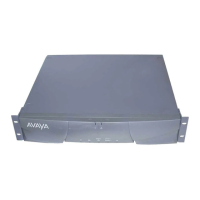153
Installing and Wiring Telephones
October 2002
2 Route the cable to the attendant console and connect to the DXS/BLF jack.
3 Attach labels according to the Attendant Console form.
4 Administer the console using Administrator’s Guide for Avaya MultiVantage Software.
Connect External Alarm Indicators and Auxiliary
Power
Alarms can be generated on adjunct equipment, sent to the media server, and recorded and
reported as “external alarms.” A typical major alarm input is from an Uninterruptible Power
Supply (UPS).
The media server provides a relay contact that can operate a customer-provided alarm, such as a
light or bell. The circuitry and power source are customer-provided. The alarm device must not
exceed a rating of more than 100 volts at 0.75 amperes.
1 Connect 1 major and 1 minor alarm input pair to the trunk/auxiliary field from the AUX
connector. See ‘‘Alarm Inputs at AUX Connector’’ on page 153
.
2 Connect an external alarm output through pins 48 and 23 of the AUX connector. See
‘‘Alarm Output at AUX Connector’’ on page 153
.
3 Note which device connects to which alarm and give this information to your Avaya
representative for troubleshooting purposes.
4 Connect emergency transfer power and auxiliary power as shown in ‘‘Emergency
Transfer and Auxiliary Power’’ on page 154. Auxiliary power includes power to an
attendant console or adjunct device.
Alarm Inputs at AUX Connector
Color AUX Connector
White-Blue AP1 (Pin 26) Major Alarm Input
Blue-White Ground (Pin 1)
White-Orange AP2 (Pin 27) Minor Alarm Input
Orange-White Ground (Pin 2)
Alarm Output at AUX Connector
Color AUX Connector
Violet-Green EXTALMA (Pin 48) Alarm Output
Green-Violet EXTALMB (Pin 23) (Ground) Alarm
Output

